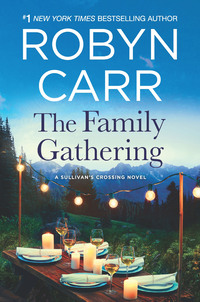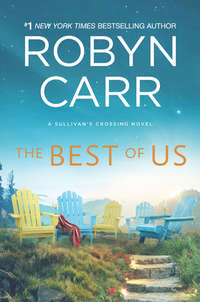
Полная версия
A Virgin River Christmas


Praise for RITA® award-winning author Robyn CARR
The American Library Association’s Booklist names Virgin River one of 2007’s top ten romances.
“The Virgin River books are so compelling—I
connected instantly with the characters and just
wanted more and more and more.”
—New York Times bestselling author Debbie Macomber
“Virgin River is sexy, tense, emotional and satisfying. I can’t wait for more!” —New York Times bestselling author Carla Neggers
“Robyn Carr writes a beautiful romance entangled
with passion and intrigue.”
—New York Times bestselling author Clive Cussler
“Jennifer is a beautifully drawn character whose
interior journey is wonderful to behold.”
—RT Book Reviews on Runaway Mistress
“This is one author who proves a Carr can fly.”
—Book Reviewer on Blue Skies
“Robyn Carr provides readers [with] a powerful,
thought-provoking work of contemporary fiction.”
—Midwest Book Review on Deep in the Valley
“A remarkable storyteller.”
—Library Journal
“A warm, wonderful book about women’s
friendships, love and family. I adored it!”
—New York Times bestselling author Susan Elizabeth Phillips on The House on Olive Street
“A delightfully funny novel.”
—Midwest Book Review on The Wedding Party
Dear Reader,
It was such an honour to be asked to create a Christmas story that would take place in Virgin River, especially because, in my mind, the miracle of Christmas is synonymous with that special town. Virgin River seems to be a place of kindness, friendship, love and miracles.
In this story you’ll meet Ian and Marcie, two courageous people who have weathered too many storms in their young lives. Both of them need two things to help them get to a place of peace and happiness: namely, faith and love. Between them they have a lot of history but, at the same time, they’re just getting to know one another. And what they find in their renewed relationship could bring them closer to the peace and serenity they both need so much.
The Virgin River novels are part of an ongoing series, and A Virgin River Christmas is a special addition to that series. While many of the well-known Virgin River characters are present in this book, you don’t have to read the first three in the series to feel at home here. But for those of you who have started at the beginning, and have waited patiently for this next book, let me put you in the time frame. A Virgin River Christmas takes place just a few weeks before Christmas—right in the middle of Whispering Rock, the third book in the continuing series.
Christmas can mean many different things to each of us. For Marcie and Ian, I’ve tried to create a special time for two people who couldn’t be more deserving.
It was a privilege to create this story. I hope you’ll treasure it.
My best wishes to you and yours,
Robyn Carr
A Virgin River Christmas
Robyn Carr

www.mirabooks.co.uk
A Virgin River Christmas is dedicated to Kris and Edna Kitna, with deep gratitude for your help, your incomparable hospitality and your friendship.
Prologue
Marcie stood beside her lime-green Volkswagen, shivering in the November chill, the morning sun barely over the horizon. She was packed and ready, as excited as she was scared about this undertaking. In the backseat she had a small cooler with snacks and sodas. There was a case of bottled water in the trunk and a thermos of coffee on the passenger seat. She’d brought a sleeping bag just in case the motel bedding wasn’t to her standards; the clothes she’d packed in her duffel were mostly jeans, sweatshirts, heavy socks and boots, all appropriate for tramping around small mountain towns. She was itching to hit the road, but her younger brother, Drew, and her older sister, Erin, were stretching out the goodbyes.
“You have the phone cards I gave you? In case you don’t have good cell reception?” Erin asked.
“Got ‘em.”
“Sure you have enough money?”
“I’ll be fine.”
“Thanksgiving is in less than two weeks.”
“It shouldn’t take that long,” Marcie said, because if she said anything else, there would be yet another showdown. “I figure I’m going to find Ian pretty quick. I think I have his location narrowed down.”
“Rethink this, Marcie,” Erin said, giving it one last try. “I know some of the best private detectives in the business—the law firm employs them all the time. We could locate Ian and have the things you want to give him delivered.”
“We’ve been over this,” Marcie said. “I want to see him, talk to him.”
“We could find him first and then you could—”
“Tell her, Drew,” Marcie implored.
Drew took a breath. “She’s going to find him, talk to him, find out what’s going on with him, spend some time with him, give him the baseball cards, show him the letter, and then she’ll come home.”
“But we could—”
Marcie put a hand on her older sister’s arm and looked at her with determined green eyes. “Stop. I can’t move on until I do this, and do it my way, not your way. We’re done talking about it. I know you think it’s dumb, but it’s what I’m going to do.” She leaned toward Erin and gave her a kiss on the cheek. Erin, so sleek, beautiful, accomplished and sophisticated—so nothing like Marcie—had been like a mother to her since she was a little girl. She had a hard time leaving off the mothering. “Don’t worry—there’s nothing to worry about. I’ll be careful. I won’t be gone long.”
Then she kissed Drew’s cheek and said, “Can’t you get her some Xanax or something?” Drew was in med school and, no, he couldn’t write prescriptions.
He laughed and wrapped his arms around her, hugging her tight for a moment. “Just hurry up and get this over with. Erin’s going to drive me nuts.”
Marcie narrowed her eyes at Erin. “Go easy on him,” she said. “This was my idea. I’ll be back before you know it.”
And then she got in the car, leaving them standing on the curb in front of the house as she pulled away. She made it all the way to the highway before she felt her eyes sting with tears. She knew she was worrying her siblings, but she had no choice.
Marcie’s husband, Bobby, had died almost a year ago, just before Christmas, at the age of twenty-six. That came after more than three years in hospitals and then in a nursing home—hopelessly disabled and brain damaged, with injuries incurred as a marine serving in Iraq. Ian Buchanan was his sergeant and best friend, a marine Bobby said would do twenty. But Ian exited the Marine Corps shortly after Bobby was wounded and had been out of touch ever since.
Since she knew that Bobby would never recover, since she had grieved his loss for a long time before he actually died, Marcie would have expected to feel a sense of relief in his passing—at least for him. She thought she’d be more than ready to step into a new life, one that had been put on hold for years. At the tender age of twenty-seven, already a widow, there was still plenty of time for things like education, dating, travel—so many possibilities. But it had been just shy of a year, and she was stuck. Unable to move forward. Wondering, always wondering, why the man Bobby had loved like a brother had dropped out of sight and had never called or written. He’d estranged himself from his marine brothers and his father. Estranged himself from her, his best friend’s wife.
So there were these baseball cards. If she stretched her imagination to the limit she couldn’t come up with anything her lawyer sister would find more ridiculous than wanting to be sure Ian had Bobby’s baseball cards. But since she’d met Bobby at the age of fourteen, she knew how obsessed he was with his collection. There wasn’t a player or stat he didn’t have memorized. It turned out that Ian was also a baseball nut and had his own collection; she knew from Bobby’s letters that they had talked about trading.
In the deserts and towns of Iraq, while they hunted insurgents and worried about suicide bombers and sniper fire, Bobby and Ian had talked about trading baseball cards. It was surreal.
Then there was this letter that Bobby wrote to her from Iraq before he was wounded. It was all about Ian and how proud it would make him to be like Ian. He was a marine’s marine—the guy who got into the mess with his men, led them with strength and courage, never let them down, hung with them through everything—whether they were up to their necks in a fight or crying over a dear-John letter. He was a funny guy, who made them all laugh, but he was a tough sergeant who also made them work hard, learn and follow every rule to the letter so they’d be safe. It was in that letter that Bobby had told her he hoped she’d support him if he decided to make it a career. Like Ian Buchanan had. If he could be half the man Ian was, he’d be damn proud; all the men saw him as a hero, someone on his way to being a legend. Marcie wasn’t sure she could part with the letter, even though it was all about Ian. But he should know. Ian should know how Bobby felt about him.
In the year since Bobby had moved into a quiet and peaceful death, she had passed his birthday, their anniversary, every holiday, and still, it was as though there was this unfinished business. There was a big piece missing; something yet to be resolved.
Ian had saved Bobby’s life. He didn’t make it out whole, but still—Ian had braved death to carry Bobby to safety. And then he’d disappeared. It was like a hangnail; she couldn’t leave it alone. Couldn’t let it go.
Marcie didn’t have much money; she’d had the same secretarial job for five years—a good job with good people, but with pay that couldn’t support a family. She was lucky her boss gave her as much time as she wanted right after Bobby was wounded, because she’d traveled first to Germany, then to D.C. to be near him, and the expenses had been enormous, far more than his paycheck could bear. As a third-year enlisted marine, he’d earned less than fifteen hundred dollars a month. She’d pushed the credit cards to the max and took out loans, despite the willingness of Erin and Bobby’s family to help her. In the end, his military life insurance hadn’t gone too far to pay those bills, and the widow’s death benefit wasn’t much either.
The miracle was getting him home to Chico, which was probably entirely due to Erin’s bulldogging. Many families of military men who were 100 percent disabled and in long-term care actually relocated to be near the patient, because the government wouldn’t or couldn’t send the patient home to them. But Erin managed to get them into CHAMPUS, a private nursing home in Chico paid for by the Civilian Health and Medical Program of the Uniformed Services. Most soldiers were not so fortunate. It was a complicated and strained system, now heavy with casualties. Erin had taken care of everything—using her exquisite lawyer’s brain to get the best benefits and stipend possible from the Corps. Erin hadn’t wanted Marcie to be stressed by benefit or money worries on top of everything else. Erin had done it all, even paid all the household bills. In addition to all that, she was somehow managing the cost of Drew’s medical college.
So, for this excursion, she couldn’t take a dime from her sister. Erin had already given so much. Drew did have some pocket change, but being a poor medical student, he didn’t have much. It would have been far more practical to wait till spring—until she’d had a chance to put aside a little more—to head into the small towns and mountains of Northern California looking for Ian Buchanan, but there was something about the anniversary of Bobby’s death and Christmas approaching that filled her with a fierce longing to get the matter settled once and for all. Wouldn’t it be nice, she kept thinking, if the questions could be answered and the contact renewed before the holidays?
Marcie meant to find him. To give peace to the ghosts. And then they could all get on with their lives ….
One
Marcie Sullivan drove into the small town, her sixth small mountain town of the day, and found herself face-to-face with a Christmas-tree trimming. The assembled staff didn’t look big enough for the job—the tree was enormous.
She pulled up beside a large cabin with a wide porch, parked her Volkswagen and got out. There were three women at work on a Christmas fir that stood about thirty feet. One was about Marcie’s age, with soft brown hair and she held an open box, perhaps containing ornaments. One woman was old, with springy white hair and black-framed glasses, who pointed upward, as if someone had put her in charge, and the third was a beautiful blonde at the top of a tall, A-frame ladder.
The tree stood between the cabin and an old boarded-up church with two tall steeples and one stained-glass window still intact—a church that must have once been a beautiful structure.
While Marcie watched the trimming, a man came out onto the cabin’s porch, stopped, looked up and cursed, then took long strides to the base of the ladder. “Don’t move. Don’t breathe,” he said in a low, commanding voice. He took the rungs every other one, climbing quickly until he reached the blonde. Then he slipped an arm around her, somewhere above what Marcie realized must be a little pregnant bulge and beneath her breasts and said, “Down. Slowly.”
“Jack!” she scolded. “Leave me alone!”
“If I have to, I’ll carry you down. Back down the ladder, slowly. Now.”
“Oh for God’s—”
“Now,” he said evenly, fiercely.
She began to descend, one rung at a time between his big, sturdy feet, while he held her safe against him. When they got to the bottom, she put her hands on her hips and glared up at him. “I knew exactly what I was doing!”
“Where is your brain? What if you fell from that height?”
“It’s an excellent ladder! I wasn’t going to fall!”
“You’re psychic, too? You can argue all you want, I’m not letting you that high up a ladder in your condition,” he said, his hands also on his hips. “I’ll stand guard over you if I have to.” Then he looked over his shoulder at the other two women.
“I told her I thought you wouldn’t like that,” the brown-haired one said with a helpless shrug.
He glared at the white-haired woman. “I don’t get into domestic things. That’s your problem, not mine,” she said, pushing her big glasses up on her nose.
And Marcie became homesick. So homesick. It had only been a few weeks that she’d been driving around this area, but she missed all the family squabbles, the tiresome complications. She missed her girlfriends, her job. She longed for her bossy older sister’s interference, her goofy younger brother and whatever current girlfriend was shadowing him. She missed her late husband’s large, fun, passionate family.
She hadn’t made it home for Thanksgiving—she’d been afraid to go for even a day or two, afraid she’d never pry herself out of Erin’s grip a second time. Home was Chico, California, just a few hours away, but no one—not her brother and sister, not Bobby’s family—thought what she was doing a good idea. So, she’d been calling, lying and saying she had tips about Ian and was close to finding him. Every time she called, at least every other day, she said she was getting closer when really, she wasn’t. But she was not ready to quit.
But one problem was looming large—she was just about out of money. She’d been sleeping in her car lately rather than in motels, and it was getting uncomfortable as the temperatures dropped in the mountains. At any moment snow would be falling now that it was early December, or rain could turn to sleet and that little VeeDub could sail off the mountainside like a missile.
She’d just hate to go home with this mission incomplete. More than anything, she wanted to see it through. If she wasn’t successful now, she’d only go home to earn a little money and then do it all again. She just couldn’t give up on him. On herself.
They were all looking at her. She pushed her wildly curly, out of control, bright red hair over one shoulder nervously.
“I … Ah … I could go up there, if you want. I’m not afraid of heights or anything …”
“You don’t have to go up the ladder,” the pregnant blonde said, and her voice had softened considerably. She smiled sweetly.
“I’ll go up the ladder,” the man said. “Or I’ll get someone to go up the goddamn ladder, but it’s not you.”
“Jack! Be polite!”
He cleared his throat. “Don’t worry about the ladder,” he said more calmly. “Anything we can do for you?”
“I … Ah …” She walked toward them. She pulled a picture out of the inside of her down vest and extended it toward the man. “I’m looking for someone. He dropped out of sight just over three years ago, but I know he’s around here somewhere. He seems to be taking mail at Fortuna Post Office general delivery.”
She passed the picture to the man. “Jesus,” he said.
“You know him?” she asked hopefully.
“No,” he said, shaking his head. “No, I don’t, and that’s strange. The guy’s a marine,” he said, studying the picture of a man in uniform. It was Ian’s official Marine Corps portrait, a handsome man all clean shaven and trussed up in dress blues, hat and medals. “I can’t believe there’s a marine within fifty miles of here I don’t at least know about.”
“He might be keeping that fact to himself—he and the Marine Corps had a troubled relationship at the end. So I’ve heard …”
He looked back at her face and his expression was much more tender. “I’m Jack Sheridan,” he said. “My wife, Mel. That’s Paige,” he said, nodding toward the younger woman. “And Hope McCrea, town busybody.” He put out his hand to Marcie.
She placed hers in his. “Marcie Sullivan,” she said.
“Why are you looking for this marine?” Jack asked.
“Long story,” she said. “A friend of my late husband. I’m sure he doesn’t look like this anymore—he had some injuries. There’s a scar down his left cheek and on that same side, no eyebrow. And he probably has a beard. He did the last time he was seen, about three or four years ago.”
“No shortage of beards around here,” Jack said. “Lumber country—men get a little scruffy-looking sometimes.”
“But he could’ve changed in other ways, too. Like—he’s older. Thirty-five now—that picture was taken when he was twenty-eight.”
“Friend of your husband’s? From the Corps?” Jack confirmed.
“Yes,” she said. “I’d like to find him. You know—because he’s been out of touch for a long time.”
Jack seemed to think while he studied the face in the picture. It was several silent moments before he said, “Come on into the bar. Have a bite, a beer maybe, or whatever you like. Tell me a little about him and why you want to find him. How’s that?”
“The bar?” she said, looking around.
“It’s a bar and grill,” he said with a smile. “Food and drink. We can eat and talk.”
“Oh,” she said. Her stomach growled angrily. It was late in the day, about four o’clock, and she hadn’t eaten yet, but she was saving her money for the gas tank and she figured she could forget about food a while longer. Maybe she’d get something real, real cheap to tide her over, like a loaf of day-old bread to go with that half a jar of peanut butter in the car …. Then, she’d find a safe spot to park and button down for the night. “A glass of water would be really welcome—I’ve been driving around for hours, showing his picture to anyone who will take a look. But I’m not hungry.”
“Got lots of water,” Jack said with a smile. He put a hand on her shoulder and started to direct her toward the porch of the bar, but then he stopped suddenly. His brows drew together in a frown. “Go ahead,” he said to her. “I’m right behind you.”
Marcie walked up on the porch and turned to see what he was doing. He was confiscating the ladder so his pregnant wife wouldn’t climb it again, that’s what he was doing. It was a jackknife kind of affair that could be a short or tall A-frame ladder, and he collapsed it, folded it up until he could lift it with one hand. It was about six feet long dismantled and he carried it right into the bar. Behind him, Marcie heard his wife yell, “You’re a bossy pain in the ass! When did I ever indicate I’d take my orders from you?”
Jack didn’t say anything back, but he grinned as though she’d just thrown him a kiss. “Hop up there,” he said to Marcie, indicating the bar. “I’ll be right back.” And he carried the ladder through a door behind the bar.
She took a deep breath and thought, Oh hell—I’m not going to be able to survive the aromas! Her stomach made itself heard again and she put a hand against her belly, pushing. Something in the kitchen was sending out waves of delicious smells—something simmering, rich, hot and thick, like beefy, seasoned soup; fresh bread; something sweet and chocolate.
And when the man named Jack came back, he was carrying a tray with a steaming bowl on it. He put everything in front of her; chili, corn bread and honey butter, a small bowl of salad. “Gee, um, sorry,” she said. “Really, I’m not hungry …”
He drew a cold draft and her mouth actually watered. Gratefully she didn’t drool on the bar. She swallowed hard. She had about thirty bucks and didn’t want to waste it on a fancy meal, not when she needed every cent for gas to hit all these little mountain towns.
“Fine, then you’ll only eat what you want,” he said. “Just have a taste. I showed the picture to Preacher, my cook. He hasn’t seen the guy either. We’ll check with Mike—he’s the town cop and gets around all the back roads, just to know who’s out there—maybe he’ll have a tip or two. They’re also marines.”
“Where exactly am I?” she asked.
“Virgin River,” he said. “Population six hundred twenty-seven at last count.”
“Ah, that made the map.”
“I should hope so—we’re a screaming metropolis compared to a lot of small towns out here. Just try it,” he said, nodding at the bowl.
Her hand trembled a little as she picked up the spoon and sampled some of the finest chili she’d ever eaten. It melted in her mouth, and she actually sighed.
“Made with venison,” he said. “We got a nice buck a couple months ago and when that happens, we have some of the best chili, stew, burgers and sausage in the world, for months.” He patted a big jar of jerky that rested on the bar. “Preacher makes some unbelievable venison jerky, too.”
Her eyes watered—the food was so good. Despite all her promises to Erin and Drew, she hadn’t been eating well or playing it carefully, scrimping on food and sleeping in the car. When Erin saw the way her jeans were hanging off her little frame, the shit was going to hit the fan.
“Want to tell me a little about our guy, between bites?” Jack asked.
Oh, what the hell, Marcie thought. She hadn’t had a really good hot meal in days, and once she was out of money there would be no choice but to go home. She’d just have to spend a little of that money, maybe leave the mountains a day earlier than she wanted to. She had to eat, for God’s sake! Couldn’t hardly perform a manhunt without food!
She took a couple of quick bites to beat back the worst of her ravenous hunger, then a sip of that icy beer to wash it down. It was heaven, pure heaven. “His name’s Ian Buchanan. We came from the same town, but didn’t know each other growing up, even though Chico’s small—only about fifty thousand. Ian’s eight years older than we are. Were. My husband and I, we grew up together, went through high school together and got married real young, at nineteen. Bobby went into the Marine Corps right out of high school.”











